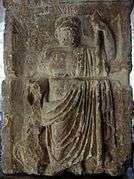Weather god
A weather god, also frequently known as a storm god, is a deity in mythology associated with weather phenomena such as thunder, lightning, rain, wind, storms, tornados, and hurricanes. Should they only be in charge of one feature of a storm, they will be called after that attribute, such as a rain god or a lightning/thunder god. This singular attribute might then be emphasized more than the generic, all-encompassing term "storm god", though with thunder/lightning gods, the two terms seem interchangeable. They feature commonly in polytheistic religions.

Storm gods are most often conceived of as wielding thunder and/or lightning (some lightning gods' names actually mean "thunder"[1][2][3], but since you cannot have thunder without lightning, they presumably wielded both). The ancients didn't seem to differentiate between the two, which is presumably why both the words "lightning bolt" and "thunderbolt" exist despite being synonyms. Storm gods are typically male (especially the lightning/thunder ones), powerful and irascible (the irascibility is probably a trait because of the command over thunder/lightning, thus the god's power over this aspect of the natural world influences his personality). Rain and wind deities tend to not be portrayed as wrathful as thunder/lightning deities.
Africa and the Middle East
Sub-Sahara Africa
- Umvelinqangi, god of thunder, Zulu mythology
- Mbaba Mwana Waresa, goddess of rain, Zulu mythology
- Oya, the Yoruba orisha of winds, tempests, and cyclones
Afroasiatic Middle East
Canaanite
Egyptian
Hebrew
- Yahweh, Hebrew divine warrior and god of the entire cosmos.
Western Eurasia
Balto-Slavic
- Audra, Lithuanian god of storms
- Bangpūtys, Lithuanian god of storms and the sea
- Perkūnas, Baltic god of thunder, rain, mountains, and oak trees. Servant of the creator god Dievas.
- Perun, Slavic god of thunder and lightning and king of the gods
Norse-Germanic
- Freyr, Norse god of rain and sunshine
- Thor, Norse god of thunder/lightning, oak trees, protection, strength, and hallowing. Also Thunor and Donar, the Anglo-Saxon and Continental Germanic versions, respectively, of him. All descend from Common Germanic *Thunraz, the reflex of the PIE thunder god for this language branch of the Indo-Europeans.[5]
Greco-Roman
- Aeolus (son of Hippotes), keeper of the winds in the Odyssey
- Anemoi, collective name for the gods of the winds in Greek mythology, their number varies from 4 to more
- Jupiter, the Roman thunder/lightning and sky god and king of the gods
- Tempestas, Roman goddess of storms or sudden weather. Commonly referred to in the plural, Tempestates.
- Zeus, Greek thunder/lightning and sky god and king of the gods
Western Asia
Anatolian-Caucasian
- Tamar (goddess), Georgian virgin goddess who controlled the weather.
- Tarḫunna, Hittite storm god; other Anatolian languages had similar names for their storm gods, such as Luwian below.
- Tarḫunz, Luwian storm god.
- Teshub, Hurrian storm god.
- Theispas or Teisheba, the Urartian storm and war god.
- Vayu, Hindu/Vedic wind god.
- Weather god of Nerik, Hittite god of the weather worshiped in the village of Nerik.
- Weather god of Zippalanda, Hittite god of the weather worshiped in the village of Zippalanda.
Persian Zorostarian
- Vayu-Vata, Iranian duo of gods, the first is the god of wind, much like the Hindu Vayu.
Asia-Pacific / Oceania
Far East Asia
- Fūjin, Japanese wind god.
- Raijin, Japanese god of thunder, lightning, and storms
- Susanoo, tempestuous Japanese god of storms and the sea.
- Tāwhirimātea, Maori storm god.
- There was no single storm god in Chinese mythology. There had to be many deities for a single storm:
- Dian Wu, Leigong, and Wen Zhong, the Thunder Deities.
- Feng Bo, Feng Po Po, and Han Zixian, the Deities of Wind.
- Yunzhongzi, the Master of Clouds.
- Yu Shi, the God of Rain.
- Sometimes the Dragon Kings were included instead of Yu Shi
Native Americas
Central America and the Caribbean
- Chaac, Maya rain god. Aztec equivalent is Tlaloc.
- Coatrisquie, Taíno rain goddess, servant of Guabancex, and sidekick of thunder god Guatauva.
- Cocijo, Zapotec god of lightning.
- Ehecatl, Aztec god of wind.
- Guabancex, top Taíno storm goddess; the Lady of the Winds who also dishes out earthquakes and other natural disasters.
- Guatauva, Taíno god of thunder and lightning who is also responsible for rallying the other storm gods.
- Huracán, K'iche Maya god of wind, storms, and fire.
- Juracán, Taíno zemi or deity of chaos and disorder believed to control the weather, particularly hurricanes
- K'awiil, classic Maya god of lightning.
- Q'uq'umatz, K'iche Maya god of wind and rain, also known as Kukulkan, Aztec equivalent is Quetzalcoatl
- Tezcatlipoca, Aztec god of hurricanes and night winds.
- Tlaloc, Aztec rain and earthquake god. Mayan equivalent is Chaac.
- Tohil, K'iche Maya god of rain, sun, and fire.
- Tupã, the Guaraní god of thunder and light. Creator of the universe.
- Yopaat, a Classic-period Maya storm god.
See also
- Rain god
- Sea god, often responsible for weather at sea
- Sky god
- Thunder god
- Wind god
References
- Scheffer, Johannes (1674). The History of Lapland. Oxford
- Eesti Keele Instituut (Eesti Teaduste Akadeemia); Eesti Rahvaluule Arhiiv (1 January 2004). Folklore: electronic journal of folklore. The Institute. Retrieved 19 August 2012.
- Orel (2003:429)
- Paul-Marie Duval. 2002. Les Dieux de la Gaule. Paris, Éditions Payot.
- Orel (2003:429)
Further reading
- Holtom, D. C. "The Storm God Theme in Japanese Mythology." Sociologus, Neue Folge / New Series, 6, no. 1 (1956): 44-56. www.jstor.org/stable/43643852.